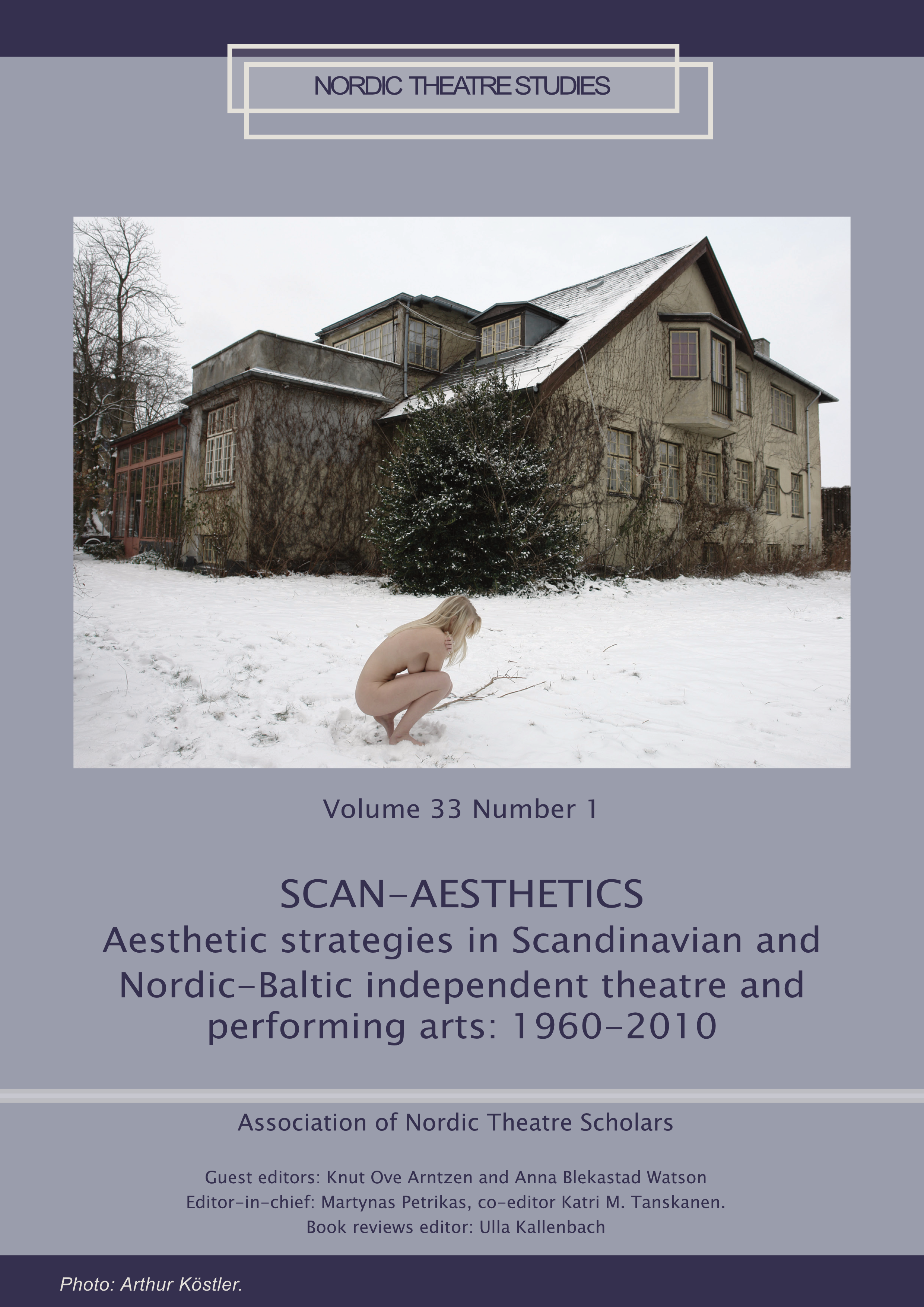Keep calm, the corridor will be open soon
Soso Daughters, representation of trauma and independent creative practice in contemporary Russian theatre
DOI:
https://doi.org/10.7146/nts.v33i1.131994Keywords:
Soso Daughters, Russia, independent theatre, scenography, feminist ethic of care, trauma, The RhymeAbstract
This article explores the creative practice of an independent Russian theatre collective, Soso Daughters. The collective was founded in Moscow by theatre
director and playwright Zhenya Berkovich in 2018 and recently premiered their fourth production. The subjects of the productions the collective performs
often delve into girls’ and women’s lives and traumatic experiences that are constantly undermined, dismissed or ignored. Driven by the feminist ethic of
care, this article aims to situate Soso Daughters’ creative work in the context of scan-aesthetic across the Nordic and Baltic regions, and to turn scholars and
spectators’ attention to the issue of an independent theatre practice in Russia. The article is based on interviews with the collective’s director and scenographer as well as first-hand observations of their productions. The article further explores the possibility of representation of trauma and traumatic experience in The Rhyme, the collective’s first production, grounding the analysis in that the holistic approach to scenography.
References
Ahmed, Sarah. 2010. “Happy Objects.” Melissa Gregg & Gregory J. Seigworth (eds.). The Affect Theory Reader. Durham and London: Duke University Press, pp.29–51.
Caruth, Cathy. 1996. Unclaimed Experience: Trauma, Narrative, and History. Baltimore and London: The Johns Hopkins University Press.
Davidova, Marina. 2018. “Geografia Nezavisimosti.” Teatr., n.35, online publication. http://oteatre.info/geografiya-nezavisimosti/ (01.02.2021)
Dobrenko, Evgeny and Shcherbenok, Andrey. 2011. “Introduction Between History and the Past: The Soviet Legacy as a Traumatic Object of Contemporary Russian Culture.” Slavonica, 17:2, 77–84.
Etkind, Alexander. 2018. “Introduction: genres and genders of protest in Russia’s petrostate.” In Birgit Beumers et al. (eds.). Cultural Forms of Protest in Russia. London: Routledge, pp.1–15.
Gilligan, Carol. 2000 (1982). In a Different Voice: Psychological Theory and Women’s Development. Massachusetts: Harvard University Press.
Hann, Rachel. 2019. Beyond Scenography, Abingdon: New York; Routledge.
Haughton, Miriam. 2018. Staging Trauma: Bodies in Shadow. London: Palgrave Macmillan.
Isupova, Julia. 2019. “Zhenya Berkovich: ‘Schitalka’, projekt ‘Docheri SOSO’.” Maskbook, an official page of the Golden Mask award. http://maskbook.ru/zhenya-berkovich/ (20.10.2021)
Ivanov, Oleg et al. 2018. ”Laboratoria buduschego teatra. Teatri Rossii: ocenka teatralnogo predlozhenia.” GITIS: The future lab. https://www.thefuturelab.ru/census (25.02.2021).
Kisilev, Aleksey.2018. “‘Kurica — ne ptica, zhenschina — ne rezhisser’: 5 rezhisserok ob otnoshenii k zhenschchine v teatre.” Afisha Daily online magazine. https://daily.afisha.ru/brain/10123-kurica-ne-ptica-zhenschina-ne-rezhisser-5-rezhisserok-ob-otnoshenii-k-zhenschine-v-teatre/ (15.01.2021)
Krizhevskiy, Aleksey. 2020. “Eto moj gorod: rezhisser Evgenya Berkovich.” Moskvichmag online magazine. https://moskvichmag.ru/gorod/eto-moj-gorod-rezhisser-evgeniya-berkovich/ (10.01.2021)
Kuzmina, Anastasia. 2020. “Vizhivaushie: nezavisimie teatri Rossii vs. COVID-19.” Teatr. online guide. http://oteatre.info/vyzhivayushhie-nezavisimye/ (10.01.2021)
McKinney, Joslin. 2019. “Scenographic materiality: Agency and intra-action in Katrin Brack’s designs.” Birgit E. Wiens (ed.). Contemporary Scenography: Practices and Aesthetics in German Theatre, Arts and Design. London: Bloomsbury Methuen Drama, 57–73.
McKinney, Joslin, and Palmer, Scott. 2017. “Introducing ‘Expanded’ Scenography.” Joslin McKinney & Scott Palmer, (eds.). Scenography Expanded: An Introduction to Contemporary Performance Design. London: Bloomsbury Methuen Drama, 1–22.
Nikolaeva, Nastya. 2017. “Ne veryu: Pochemu v teatrakh tak malo zhenshchin-rezhissorov.” Wonderzine online magazine. https://www.wonderzine.com/wonderzine/entertainment/art/229030-female-theatre-directors (07.09.2020)
Polikhovich, Aleksey. 2020. “Kurica ne ptica, baba ne rezhisser.” Takie Dela independent online platform for culture and society. https://takiedela.ru/2020/11/kurica-ne-ptica-baba-ne-rezhisser/ (20.01.2021)
Pollock, Griselda. 2009. “Art/Trauma/Representation.” In Parallax, vol.15, no.1, 40-54.
Raykina, Marina. 2019. Galina Volcheck: kak pravilo vne pravil. Moskva: Novoe Literaturnoe Obozrenie.
Solga, Kim. 2016. Theatre and Feminism. London: Palgrave Macmillan.
Uschakin, Sergey. 2009. “‘Nam etoj bolyu dyschat?’: O travme, pamyati I soobshestavah.” Sergey Uschakin and Elena Trubina (eds.). Travma: Punkty. Moskva: Novoe Literaturnoe Obozrenie, 5–43.
Vislova, Anna. 2009. Russkiy teatr na slome epokh. Rubezh XX-XXI vekov. Moskva: Universitetskaya kniga.
Interviews
Ksenia Sorokina Skype interview 15.01.2021. Interviewed by Olga Nikolaeva. The private archive of Olga Nikolaeva
Zhenya Berkovich Zoom interview 03.09.2021. Interviewed by Olga Nikolaeva. The private archive of Olga Nikolaeva.
Sources
Soso Daughters, official webpage, https://www.sosodaughters.com/
Teatr., official webpage, http://oteatre.info/
The Union of Theatre Workers of the Russian Federation, official webpage, http://stdrf.ru/
Conciliation Resources, official webpage, https://www.c-r.org/
GULAG History Museum, official webpage, https://gmig.ru/en/
Lubimovka: Festival of Young Dramaturgy, official webpage, https://lubimovka.ru/
Human Rights Centre Memorial, official webpage, https://memohrc.org/en
Downloads
Published
Versions
- 2022-03-17 (2)
- 2022-03-12 (1)
How to Cite
Issue
Section
License
The copyright belongs to the authors and Nordic Theatre Studies. Users can use, reuse and build upon the material published in the journal but only for non-commercial purposes. Users are allowed to link to the files, download the files, distribute the files on a local network (preferably by links), upload the files to local repositories if their institutions require them to do so, but not republish the files without proper agreements with the journal and the author.

